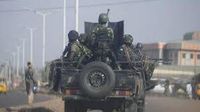In a sweeping counter-terrorism push that has reverberated across West Africa, Nigerian and Chadian authorities have arrested several key militant leaders, marking a pivotal moment in the region’s long and bloody struggle with jihadist violence. The arrests—hailed by both local officials and the United States—target the upper echelons of notorious groups like Ansaru, Mahmuda, and an Islamic State West Africa Province (ISWAP)-affiliated cell, and could represent a turning point in the fight against terrorism in the Lake Chad basin and beyond.
The most headline-grabbing development came with the capture of Mahmud Muhammad Usman (also known as Abu Bara’a) and Mahmud al-Nigeri (aka Mallam Mamuda), both of whom have been on Nigeria’s and international most-wanted lists for years. According to Nigeria’s National Security Adviser, Nuhu Ribadu, the two men were apprehended during a coordinated, multi-agency operation conducted between May and July 2025. Ribadu, speaking at a press conference, described the operation as a “targeted” effort that resulted in the recovery of valuable digital evidence now undergoing forensic analysis—a trove that could lead to further arrests.
“These two men have been on Nigeria’s most-wanted list for years. They jointly spearheaded multiple attacks on civilians, security forces, and critical infrastructure,” Ribadu stated, as reported by Agence France-Presse. Their operations include the infamous 2022 Kuje prison break near Abuja, which temporarily freed hundreds of inmates, many with ties to Boko Haram. The pair are also linked to the 2013 assault on the Niger uranium facility and the abduction of French engineer Francis Collomp in Katsina, as well as the kidnapping of Alhaji Musa Umar Uba in 2019. These attacks, among others, have left scars across Nigeria’s north and central regions, fueling a climate of fear and instability.
The United States moved quickly to commend the Nigerian government and its security forces for the arrests. The U.S. Mission in Nigeria released a statement saying, “We commend the Nigerian Government and security forces on the successful arrest of wanted #Ansaru leaders, Mahmud Muhammad Usman (aka Abu Bara’a) and Mahmud al-Nigeri (aka Mallam Mamuda). This is a significant step forward in Nigeria's fight against terrorism and extremism.” The statement highlighted that such actions reflect Nigeria’s growing capacity to counter extremist networks and contribute to broader regional stability.
This praise fits within Washington’s broader counterterrorism strategy in Africa, where the U.S. has long provided intelligence, training, and military support to partner nations. Notably, on August 13, 2025, the U.S. government approved a $346 million arms sale to Nigeria to bolster its fight against insurgency and criminal groups—a clear sign of continued international backing for Nigeria’s security efforts.
Ansaru, formally known as Jama’atu Ansarul Muslimina fi-Biladis Sudan, has a complex and violent history. The group emerged in 2012 as a splinter from Boko Haram, initially rejecting the latter’s extreme tactics but eventually adopting similar violence. Ansaru quickly aligned itself with Al-Qaeda in the Islamic Maghreb (AQIM), and in 2013, the United States designated it as a Foreign Terrorist Organization. The group’s notoriety grew with high-profile kidnappings, such as the 2013 abduction and execution of seven international construction workers and the kidnapping of a Briton and an Italian in Kebbi state—a rescue attempt that ended in tragedy.
After several years of dormancy, Ansaru dramatically resurfaced on January 15, 2020, with an ambush that killed six Nigerian soldiers escorting the Emir of Potiskum in Kaduna State. Between February and August of that year, the group claimed three additional attacks, using al-Qaeda-linked propaganda channels to announce its return to the global jihadist stage. The group has sought to exploit Nigeria’s deteriorating security environment, marked by banditry, communal violence, and the broader spread of jihadist violence across the Sahel. The recent arrests, however, mark what Ribadu called “the most decisive blow against Ansaru since its inception,” effectively dismantling its central command and paving the way for the group’s potential annihilation.
The operation’s impact has been felt beyond Nigeria’s borders. In neighboring Chad, authorities arrested Muslim Mohammed Yusuf, the 18-year-old youngest son of Boko Haram founder Mohammed Yusuf, along with five other suspected militants. According to intelligence sources cited by AFP, Yusuf allegedly led a jihadist cell affiliated with ISWAP, a Boko Haram splinter group that has grown increasingly powerful in the Lake Chad region. Chadian police confirmed the detention of six Boko Haram members, though they did not specify names. Yusuf, who reportedly uses the alias Abdrahman Mahamat Abdoulaye, is also the younger brother of ISWAP leader Habib Yusuf (Abu Mus’ab Al-Barnawi).
Boko Haram and its offshoots have terrorized the Lake Chad basin for more than 15 years, mounting relentless attacks on villages and military installations. The arrest of Muslim Yusuf is particularly symbolic, given his family’s deep ties to the insurgency. A former lieutenant of Mohammed Yusuf, now a critic of Boko Haram, confirmed to AFP that Muslim Yusuf and his associates were indeed detained. Chadian police spokesman Paul Manga described the detainees as “bandits who operate in the city… they are undocumented, they are members of Boko Haram.”
Security analysts see these arrests as a watershed moment. Oluwole Ojewale, of the Institute of Security Studies in Dakar, told the Associated Press that the decapitation of Ansaru’s leadership “marks the most decisive blow against ANSARU since its inception” and will test the group’s ability to regroup or launch further attacks. He cautioned, however, that the real impact depends on how Nigerian authorities leverage the intelligence gathered during the operation.
Despite years of military operations, Nigeria faces a daunting security landscape. Religious militants—such as Boko Haram, Ansaru, and ISWAP—operate alongside amorphous criminal bands who specialize in kidnapping for ransom. Sometimes, their activities overlap or even reinforce one another. The recent arrests, officials hope, will disrupt these networks and restore some measure of stability to a region long plagued by violence.
President Bola Tinubu’s administration has framed the capture of Usman and al-Nigeri as a “significant breakthrough in the war against terrorism.” Yet, as history has shown, the struggle against militancy in Nigeria and the wider Sahel is far from over. The resilience of these groups, their shifting alliances, and the region’s complex social and economic challenges mean that lasting peace will require not only military victories but also sustained governance, development, and international cooperation.
For now, though, the arrests signal a rare moment of optimism—a chance, however fleeting, for communities in Nigeria and across the Lake Chad basin to glimpse the possibility of a future free from the shadow of terror.


